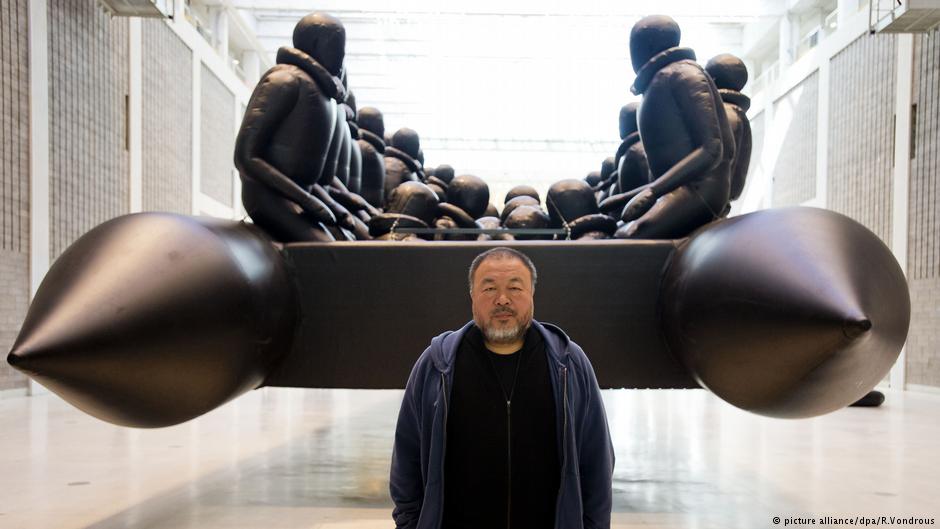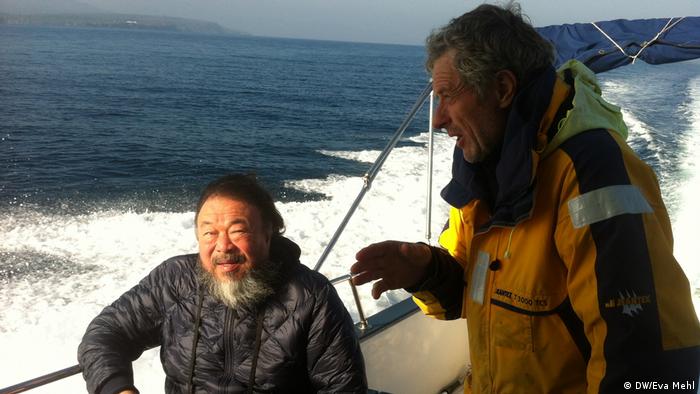A Brief Colonial History Of Ceylon(SriLanka)
Sri Lanka: One Island Two Nations
A Brief Colonial History Of Ceylon(SriLanka)
Sri Lanka: One Island Two Nations
(Full Story)
Search This Blog
Back to 500BC.
==========================
Thiranjala Weerasinghe sj.- One Island Two Nations
?????????????????????????????????????????????????Saturday, June 17, 2017
'Ai Weiwei Drifting': China's most famous, displaced artist


One year with Ai Weiwei: DW premieres documentary

- Author Ceyda Nurtsch (als)-14.06.2017
The DW documentary "Ai Weiwei Drifting" initially aimed to showcase Chinese artist Ai Weiwei's work at Berlin's University of the Arts, but it ended up focusing on much more. It shows China's most famous artist in the western world as a filmmaker, architect, concept artist and sculptor, but also as a father.
Drawing on his experiences as a displaced person, and in light of the
refugee catastrophe that has also overcome Europe, he himself created
his own film entitled "Human Flow," which is currently in
post-production. That movie, which employed film teams in 25 different
countries, including Afghanistan, Palestine and Mexico, shows the
tragedy of people who flee their native countries, only to drown by the
thousands in the Mediterranean Sea.
On the edge
DW filmmakers Eva Mehl and Bettina Kolb followed Ai Weiwei on that
journey for 15 months to produce their 56-minute documentary. It offers a
glimpse into the artist's work at the Greek-Macedonian border in
December 2015, for instance, when he interviewed, filmed and
photographed refugees at a camp near the village of Idomeni.
An oppressive feeling can overcome viewers while they watch Ai take
pictures with his cell phone of the refugees walking through the mud in
their flip-flops or in their improvised tents, or when he looks through
his camera to find the right angle on those he wants to interview.
Does art have no boundaries? This question has accompanied the artist in all of his work.
His fans see him as an agitator who masterfully pours salt on the wound
with his work - such as when he drew attention to the serious deficits
in the Chinese construction industry with his installation of 9,000
school backpacks representing thousands of pupils who died during the
2008 Sichuan earthquake. The artist pointed to the poor construction of
the schools that were not able to withstand such a high-magnitude quake.
His critics, on the other hand, view him a media-hungry personality who manipulates via his supposed political statements.
Those critical voices grew louder when he re-enacted the 2015 photo of
the young Syrian boy Alan Kurdi, whose corpse washed ashore on the
Turkish coast. In "Ai Weiwei Drifting," he takes a clear stance on the
outrage unleashed on him, saying that no one is in the position to tell
him why that was immoral.
He finds it absurd that people would get upset about his depiction, but
not about the children who die on a daily basis in Aleppo. The answer to
the question about art's boundaries thus becomes apparent: "As long as
artists are human beings, they must grapple with human crises," he says.
Intimate view
In addition to the film shots looking at his work about migration and
the act of fleeing, Mehl and Kolb also accompanied the artist to visit
the stations of his life in Beijing, New York and Berlin. He discusses
his famous poet father Ai Qing, who was persecuted during Mao's cultural
revolution.
The film looks at Ai Weiwei's years in New York from 1981 to 1993, his incarceration in 2011, and his move to Berlin in 2015.
For the first time, the film reveals moments from his personal life:
cooking in his Berlin kitchen, or watching television with his son. It
shows a Beijing visit to see his mother, who is the only person in the
film to talk about Ai. The filmmakers were able to capture these moments
in an authentic way, such as when he admits that his son has a stronger
relationship to his mother than to him. His son says he is strict and
meddles into things that are not his business.
"Weiwei was an enigma to me," said filmmaker Bettina Kolb. "I never knew
what was going on in his head, but one thing was clear: His thinking is
super-fast."
Filmmaker Eva Mehl, on the other hand, was impressed by the way Ai
approaches people. "He just sat down with them to spend a little time
with them," she said.
The film "Ai Weiwei Drifting" uses impressive film images to present a
very personal profile of one of the world's currently most famous
artists, who says about himself: "I do not have a home country. My
native country is the internet."
"Ai Weiwei Drifting" is a 56-minute documentary film by Deutsche Welle,
produced by Eva Mehl and Bettina Kolb. It premiered in Berlin on June 13
and will run on DW's television program starting on June 24, 2017.
Together with the documentary, an online special will present the life of this exceptional artist whose childhood was dominated by flight and exile.



